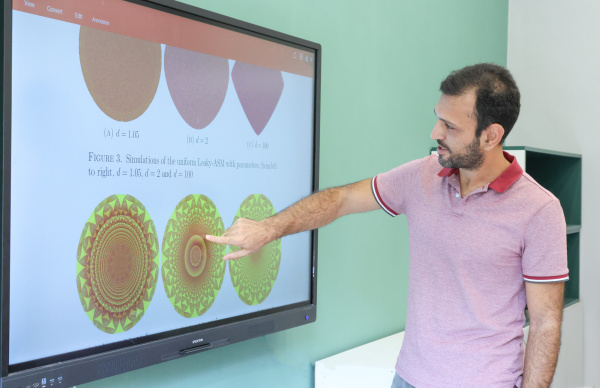October 18, 2024 | 12:00
Education
Society
International cooperation
The role of mathematics in the evolving world: YSU hosts University of Rochester lecturer
Sevak Mkrtchyan, a mathematics lecturer at the University of Rochester (New York, USA), is leading the "Random Processes" course at the YSU Faculty of Mathematics and Mechanics as part of the Fulbright scientific program. He is sharing his experience and knowledge with university students.

Sevak Mkrtchyan moved to the USA in 2001 during his university studies. When discussing his decision to teach at YSU under the Fulbright scientific program, he noted that he chose YSU because its courses are more advanced and closely aligned with scientific mathematics. We spoke with Sevak Mkrtchyan about the relevance of the topic and the development of mathematics, education, and science.
- Mr. Mkrtchyan, why did you choose the topic "Random Processes," and how relevant is it?
- I teach this course to fourth-year students at the YSU Faculty of Mathematics and Mechanics because random processes are a key area within probability theory, closely aligned with my research focus. As for its relevance, probability theory is a rapidly evolving branch of mathematics that plays a significant role in mathematical physics. In recent decades, it has found extensive applications in modern fields like mathematical finance and data science.
- What key differences do you see in the educational processes at YSU compared to the University of Rochester?
- One significant difference is that students admitted to the same faculty at the University of Rochester are grouped according to their knowledge and abilities. This system allows for in-depth study tailored to each student's strengths. If a student has strong abilities, they can delve deeply into the subject, while others may focus on more general knowledge. Students have the flexibility to choose the group that suits them, with guidance from professors.

Another important difference pertains to the distribution of coursework. At the University of Rochester (and in the USA generally), students typically take 4-5 subjects per semester, while YSU students take 8-9 subjects. Despite the fewer subjects, the workload at US universities remains substantial; in addition to 2-3 hours of lectures per week per subject, students are expected to engage in double or triple the amount of independent work to master the material and complete assignments. For instance, just the other day, my students mentioned that they spent almost their entire Saturday doing homework and studying a new topic for my course. As one of my colleagues likes to say, "To learn mathematics, you need to work hard on your own."
- What do you think are the necessary steps to increase interest in mathematics among students and applicants?
- There seems to be significant interest in natural sciences and mathematics among schoolchildren. However, many of these students choose other fields due to a lack of suitable job opportunities in mathematics. If there is a greater demand for specialists in this area, more students will pursue their education in mathematics.
- What is the role of mathematics as a science in the evolving world?
- The role of mathematics is increasingly significant across nearly all fields, especially in IT. Just a few decades ago, computer science was considered a branch of mathematics. Having successfully developed, it has become a distinct discipline, with mathematicians as its founders. Today, there is a type of programming that is more craft-based, and there is also a type of programming that is like a science (for example, the theory of algorithms is studied by those involved in applied mathematics). One prominent area of programming is data science, which focuses on analyzing large datasets to extract useful information, relying heavily on various mathematical theories, particularly probability theory. Thus, mathematics holds an essential place in our evolving world.
- Can we state that mathematics as a science is making great progress and that there is a high demand for mathematicians in the world?
- Mathematics is actively developing not only as an independent science but also as an applied science, serving as a "tool" in various fields. For instance, the number of papers in probability theory on the arXiv platform has significantly increased over the past decade: in 2013, there were 2,573 scientific works, while in 2023, that number rose to 4,744. Recent years have also seen substantial progress in several long-standing problems. Additionally, complex mathematics is increasingly used in modern chemistry, and contemporary microeconomics cannot exist without it. Therefore, mathematics is indeed in great demand worldwide.
- In your opinion, what needs to be done to ensure the continuous development of science?
- I think the educational system should be organized in such a way that those who choose a path in science are sure they will have opportunities to pursue their favorite work in the future. Individuals engaged in scientific work can create what has never been done before, becoming authors of innovations and contributing to the advancement of science. This is an incredibly interesting pursuit, and based on my experience, I can say that when the academic system is well-designed, the best students tend to pursue careers in science.
I am very happy to have had the opportunity to teach at YSU and communicate face-to-face with both students and teaching staff. The contributions of the teaching staff at the faculty to the development of the field in Armenia are especially commendable. I believe that today’s university students will become leading specialists and authors of numerous innovations, fostering greater interest in science in the country and advancing the field.

